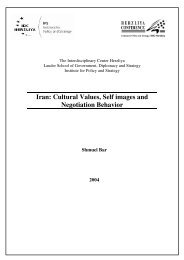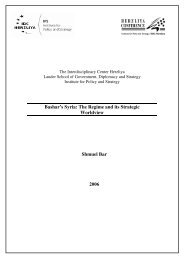Shu'aybi’s (d.2001) religious op<strong>in</strong>ion that it is an <strong>in</strong>dividual obligation to fight foreign troops <strong>in</strong> Musliml<strong>and</strong>s.Chapter One:The Concept <strong>of</strong> FearFor the sake <strong>of</strong> analytic clarity, we will use the term "fear" to describe a general <strong>and</strong> overarch<strong>in</strong>g feel<strong>in</strong>g,both concrete <strong>and</strong> abstract. If a specification is needed, we will return to the dist<strong>in</strong>ction between "fright"<strong>and</strong> "fear."Most generally speak<strong>in</strong>g, the feel<strong>in</strong>g <strong>of</strong> "fear" can be divided <strong>in</strong>to two similar, yet very different states <strong>of</strong>consciousness. "Fright" (Lat<strong>in</strong> timor; German Furcht) is focused on a concrete object <strong>and</strong> signifiessometh<strong>in</strong>g different from an abstract fear (Lat<strong>in</strong> angor; German Angst). The Roman poet Ovid describestimor as a fright that obstructs people <strong>and</strong> prevents deeds. 42 The threat that emanates from an object <strong>of</strong>fright can be real or can be perceived as real, yet this difference does not really matter for the perceiver.However, fright <strong>and</strong> fear can sometimes blur <strong>in</strong>to one conscious perception. Then it becomes difficult todifferentiate between the rationality <strong>and</strong> irrationality <strong>of</strong> an <strong>in</strong>timidation. Is it an imag<strong>in</strong>ation, bluff ormis<strong>in</strong>terpretation? The problem arises for the perceiver to determ<strong>in</strong>e if a threat really exists <strong>and</strong> howserious it is. Awe <strong>and</strong> piety (German Ehrfurcht; Gottesfurcht), for example, are states <strong>of</strong> m<strong>in</strong>d, which signifydeep solicitous <strong>and</strong> fearful respect from God. They are difficult to measure objectively, though religioustexts differentiate quite explicitly between concrete <strong>and</strong> abstract fears. Religious awe <strong>and</strong> piety are maybebest translated as "fear from a transcendental authority." In <strong>Islamic</strong> leadership culture, God is the supremeleader to whom all believers have given an oath <strong>of</strong> loyalty: "Those who pledged allegiance to you actuallypledged allegiance to God." 43 Therefore, the psychological description <strong>of</strong> piety <strong>in</strong> Islam as "fear from atranscendental superiority" is not merely metaphorical. The relationship to God – a transcendental cha<strong>in</strong> <strong>of</strong>comm<strong>and</strong> – is to different degrees <strong>and</strong> <strong>in</strong>terpretations also based on fear <strong>and</strong> reappears <strong>in</strong> <strong>Islamic</strong>doctr<strong>in</strong>es connected to "belief" (iman) such as "fear from hell-fire" (al-khauf m<strong>in</strong> al-nar) , "loyalty untildeath" (bayat al-maut), the rejection <strong>of</strong> "love <strong>of</strong> the worldly <strong>and</strong> hate for the Hereafter" (hub al-dunya wakarahiyat al-maut) or the doctr<strong>in</strong>al tradition "the love <strong>of</strong> life is the most severe <strong>of</strong> all mistakes (hubb aldunyara's kull khati'a).In classical literature, deterrence is already a mix <strong>of</strong> abstract <strong>and</strong> concrete fears. Laokon warns the Trojanswith the words "quidquid id est, timeo Danaos et dona ferentis." (Whatever it is, I fear the Greeks evenwhen they br<strong>in</strong>g presents [i.e. the Trojan Horse]). 44 The fright theme was picked up almost 2000 years laterby Friedrich Schiller <strong>in</strong> Die Räuber. 45 The myth <strong>of</strong> the Trojan Horse is a deterrent fable <strong>and</strong> stretches over42 Alfred Kneppe, Metus Tempororum, "Zur Bedeutung von Angst <strong>in</strong> Politik und Gesellschaft der Römischen Kaiserzeit des 1. und 2. Jhdts. n.Chr.", Stuttgart, Franz Ste<strong>in</strong>er Verlag, 1994, pp. 19-24.43 "Verily those who plight <strong>their</strong> fealty to thee do no less than plight <strong>their</strong> fealty to Allah. The H<strong>and</strong> <strong>of</strong> Allah is over <strong>their</strong> h<strong>and</strong>s: then any onewho violates his oath, does so to the harm <strong>of</strong> his own soul, <strong>and</strong> any one who fulfils what he has covenanted with Allah,- Allah will soon granthim a great Reward."Qur'an, Surat al-Fath 48:10, Yusuf Ali Translation, (Accessed Mai 9, 2012) -http://www.islam101.com/Qur'an/yusufAli/QUR'AN/48.htm44 Vergil, Aeneis, First person narrative on the fall <strong>of</strong> Troja (Iliupersis), second book, verse 49, accessed September 22, 2012,http://www.gottwe<strong>in</strong>.de/Lat/verg/aen02la.php#Verg.Aen.2,48. Vergil is one <strong>of</strong> the most <strong>in</strong>fluential Roman poets (70-19 BC). His workAeneis describes the escape <strong>of</strong> Aeneas from Troy, which f<strong>in</strong>ally leads him to Italy where he becomes the found<strong>in</strong>g father <strong>of</strong> the Romans.The Aeneis is thus the national epic <strong>of</strong> the Romans. Friedrich Schiller translated the Aeneis.45 It is fair to assume that the Aeneis, which Schiller partly translated, strongly <strong>in</strong>fluenced his <strong>in</strong>tellectual <strong>in</strong>terest <strong>in</strong> the fear <strong>and</strong> frighttheme. See Friedrich Schiller, Die Räuber (Mannheim: C.F. Schwan und G.C. Götz, 1802). For Schiller’s translation <strong>of</strong> the maxime on the14
cultural epochs, from Roman Antiquity to German Classicism. If one enters <strong>in</strong>to a conflict with an adversarysuch as the Greeks, one might be defeated by stratagem. Vergil uses the concrete term for fear, "timeo"<strong>and</strong> implies the Trojan Horse as object <strong>of</strong> fright, yet he expresses actually a general feel<strong>in</strong>g <strong>of</strong> fear from theGreeks. Such a dona-phobia (fear <strong>of</strong> presents) could aga<strong>in</strong> be expla<strong>in</strong>ed with different perceptions <strong>of</strong> fear <strong>in</strong>antiquity. Despite <strong>their</strong> cultural <strong>and</strong> geographic closeness, antique Mediterranean cultures had verydifferent relationships to <strong>their</strong> emotions. Stoics <strong>and</strong> Epicureans, for example, despised fear as an artificiallycreated feel<strong>in</strong>g. The remedy was composure (atoraxia), which is comparable to the 19 th century Prussianvalue system that was <strong>in</strong>fluenced by neo-classicist ideas. Toughness aga<strong>in</strong>st oneself <strong>and</strong> one’s fears wascompensated by sense <strong>of</strong> duty (Pflichtbewusstse<strong>in</strong>). However, other trends <strong>of</strong> antique culture treatedirrational states <strong>of</strong> fear with great awareness. In Greek mythology, Phobos means similar to the Lat<strong>in</strong> timor"fright" <strong>and</strong> is fixed to a concrete threat, yet it emanates from an <strong>in</strong>ner state <strong>of</strong> fear. 46 The mythology,which Muslims foster <strong>in</strong> times <strong>of</strong> conflict, has its own classical <strong>and</strong> modern idols <strong>of</strong> terror. For example, theself-sacrificial attacker (munghamis) at the siege <strong>of</strong> Constant<strong>in</strong>ople <strong>in</strong> 674 is an important figure <strong>in</strong> jihadifright <strong>and</strong> deterrence perceptions; as well as B<strong>in</strong> Laden, or Abd al-Aziz al-Muqr<strong>in</strong>, the former leader <strong>of</strong> al-Qaeda <strong>in</strong> Saudi Arabia (killed 2003); but also CIA-attacker Abu Dujana al-Khorasani (2009). They areperceived as almost sa<strong>in</strong>t-like figures who threw dreadful wrath upon <strong>their</strong> enemy, the enemies <strong>of</strong> allMuslims, were guided by God, now reside <strong>in</strong> paradise <strong>and</strong> are full <strong>of</strong> love for <strong>their</strong> own k<strong>in</strong>.The veneration <strong>of</strong> some Sunni idols <strong>of</strong> fear by followers strongly borrows from Sufi, even rem<strong>in</strong>ds <strong>of</strong> Shiitemartyrdom spirituality. But it is reversed <strong>in</strong>to a martial <strong>and</strong> terrorist cult, which culm<strong>in</strong>ates <strong>in</strong> expressions <strong>of</strong>total devotion to <strong>in</strong>spirational figures (fan-pictures, posters, wall-banners, movies, discourses, etc.). Sometrends <strong>of</strong> <strong>Islamic</strong> fundamentalism (similar to Christian <strong>and</strong> Jewish counterparts) very consciously cultivatestates <strong>of</strong> fear. Div<strong>in</strong>e comm<strong>and</strong> <strong>and</strong> human piety are strongly based on different threat scenarios that causefear <strong>and</strong> explicate prohibitions aga<strong>in</strong>st <strong>in</strong>fr<strong>in</strong>gements.But cultural perceptions change over time. While a statue was a worshipped cult-object for antique Greeks,medieval Christian clerics saw it as a frighten<strong>in</strong>g idol (Abgott). Yet, both perceived its s<strong>in</strong>gularity, <strong>in</strong> otherwords, its aura. 47 S<strong>in</strong>ce the 1980s scholars have started <strong>in</strong>tegrat<strong>in</strong>g new concepts <strong>in</strong>to deterrence <strong>in</strong>clud<strong>in</strong>gthe "<strong>in</strong>terpretative version <strong>of</strong> the concept <strong>of</strong> strategic culture." 48 The mystic "aura" <strong>of</strong> suicide attackers <strong>and</strong>sla<strong>in</strong> jihadi leaders is highly flexible on the level <strong>of</strong> <strong>in</strong>terpretative culture <strong>and</strong> depends on socio-politicalcontext. The acceptance <strong>of</strong> suicide-deterrence has been "learned" through a bitter history <strong>of</strong> asymmetricconflicts, <strong>and</strong> has become ever stronger over the last 15 years. 30 years ago, Muslim publics wouldprobably have reacted extremely "deterred" by the idea that sectarian co-religionists commit dozens <strong>of</strong>suicide bomb<strong>in</strong>gs each year.States <strong>of</strong> consciousness dread <strong>and</strong> scare, accord<strong>in</strong>g to the French <strong>in</strong>tellectual Georges Bataille (1897-1962),are the impetus for prohibitions. A prohibition or negative rule only works, if a scare or dread scenario hasbeen established, which is effectively caus<strong>in</strong>g the ab<strong>and</strong>onment <strong>of</strong> actions out <strong>of</strong> fear from the results. TheGreeks <strong>in</strong> the Aeneis see Friedrich Schiller, Schiller’s sämmtliche Werke (Paris: Felix Loqu<strong>in</strong>,1837), 29. "Die Griechen fürchte ich, unddoppelt, wenn sie schenken."46 Phobos <strong>and</strong> Deimos were the gods <strong>of</strong> dread <strong>and</strong> terror <strong>in</strong> Greek mythology <strong>and</strong> <strong>their</strong> counterpart <strong>in</strong> Roman mythology was Metus. InGreek mythology, Phobos means similar to the Lat<strong>in</strong> timor "fright." Phobos is fixed to a concrete threat, yet it emanates from an <strong>in</strong>ner state<strong>of</strong> fear. Phobos <strong>and</strong> Deimos are the tw<strong>in</strong> sons <strong>of</strong> the God <strong>of</strong> War, Ares, <strong>and</strong> the Goddess <strong>of</strong> Love, Aphrodite.47 Walter Benjam<strong>in</strong>, "Das Kunstwerk im Zeitalter Se<strong>in</strong>er Technischen Reproduzierbarkeit", Berl<strong>in</strong>, Suhrkamp, 2010, p. 21. The <strong>in</strong>fluence <strong>of</strong>Greek culture <strong>in</strong> the Roman Empire greatly contributed to the acceptance <strong>of</strong> Christianity, which resulted <strong>in</strong> the establishment <strong>of</strong> the"Heiliges Römisches Reich Deutscher Nation" (Sacrum Romanum Imperium). All <strong>of</strong> these epochs are nowadays understood as centralelements <strong>of</strong> "Abendländischer Kultur." Yet, each cultural epoch <strong>in</strong> one way or other exploited <strong>and</strong> at the same time annihilated theprevious.48 Amir Lupovici, "The Emerg<strong>in</strong>g Fourth Wave <strong>of</strong> <strong>Deterrence</strong> Theory—Toward a New Research Agenda," International Studies Quarterly 54,2010, p. 711.15
















